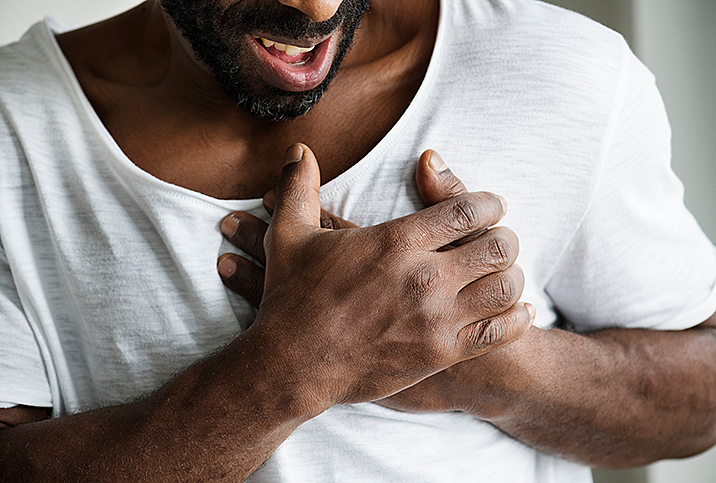Listen to Your Heart: Signs You Shouldn't Have Sex Right This Minute

Some days your heart's just not up for sex, and that's OK. If you're feeling off, the best decision you can make for your health may be to postpone sex—because the chances of having a heart attack slightly increase during intense physical exertion, including intimacy. And while sex might feel like the most natural thing in the world, if you have many medical issues and comorbidities, you should clear sexual activity (including the use of erectile dysfunction medications) with your doctor first, especially if you have a history of cardiac events.
Before you get frisky, keep an eye out for these common symptoms of heart problems:
Chest pain
Angina, or chest pain related to reduced blood flow to the heart, is a symptom of coronary artery disease and may indicate an increased risk of a heart attack. Angina can feel like pain, tightness, squeezing, pressure, heaviness or general chest discomfort. Heart-related pain may also be felt in one or both arms or in the neck, back, jaw or stomach. Many people experience angina intermittently, and it may come on suddenly, particularly during physical activity. Chest pain can be a warning sign of a heart attack or strain on the heart that may lead to one.
If you experience chest pain, you should take medications as prescribed by your doctor (aspirin, nitrates, beta blockers) and avoid physical activity that may further increase symptoms. Nitrates for angina should not be taken with ED medications, including sildenafil (Viagra) and tadalafil (Cialis). Unfortunately, activity restrictions may include sex, as research shows intercourse increases the heart's demand for oxygen, placing extra strain on this vital organ. Heart rate and blood pressure also rise during lovemaking, further elevating risk. Sex-induced angina accounts for less than 5 percent of all angina attacks, but men who can exercise without angina are less likely to experience problems. Cases of unstable or uncontrolled angina indicate a higher likelihood of an adverse event and suggest sex should be avoided until approved by a doctor or symptoms resolve.
Shortness of breath
Shortness of breath may indicate insufficient oxygenation due to impaired blood flow, a significant risk factor for a cardiac event. It can happen with or without chest pain. Researchers at Cedars-Sinai Medical Center in Los Angeles found individuals with shortness of breath can have a higher risk of dying from cardiac disease than those without it and those with typical cardiac pain. They also noted fighting for air was a significant predictor of cardiac events.
Shortness of breath can be more difficult to identify and, unfortunately, is more commonly brushed off than chest pain. This can be a serious oversight, because in some cases, it may be the only warning sign of strain on the heart. For all of these reasons, shortness of breath is a particularly important signal of possible heart problems. If you notice you're struggling for air when walking or climbing a flight of stairs, avoiding sex and other physical activity may help prevent the condition from escalating into a potentially life-threatening event.
Irregular heartbeat
Changes in heartbeat may be indicative of strain on the heart. Heart palpitations, or a rapid, fluttering heart rate or the sensation of "skipping a beat" are commonly experienced before and during a heart attack. Some people experience an irregular rhythm, or arrhythmia. Irregularities can be caused by changes in electrical impulses to the heart or scar tissue from a previous heart attack. Irregularities and palpitations should be evaluated by a physician. Physical changes in heartbeat and heart rate are often accompanied by emotional anxiety or a feeling of unease.
Many individuals with hypertension and heart disease experience intermittent tachycardia, or rapid heart rate. If you notice it or associated symptoms including feeling flushed, lightheaded or dizzy, consider these to be signs that you should take it easy.
Nausea and indigestion
This one may surprise you—even gastrointestinal issues can be indicators of heart problems. Nausea, vomiting, heartburn or stomach pain are common before and during a heart attack. These symptoms can be related to injured heart muscle cells (cardiomyocytes), which release metabolites that can trigger stimulation of the nervous system, causing you to feel sick to your stomach. And while indigestion may very well be entirely unrelated to your heart health and actually tied to your latest meal, it could be an indicator that something's going on with your heart. Although less common signals than chest pain, shortness of breath and heartbeat changes, feeling nauseous and generally unwell may be important signs you shouldn't ignore.
Sex is good for your overall health, including heart health, and you shouldn't hesitate to engage if you're cleared by your doctor. Just be sure to take the day off if you notice key signs that you might be having a poor heart health day. Being in tune with your body is an important way to maximize wellness—and avoid the potential for problems that could turn serious

















